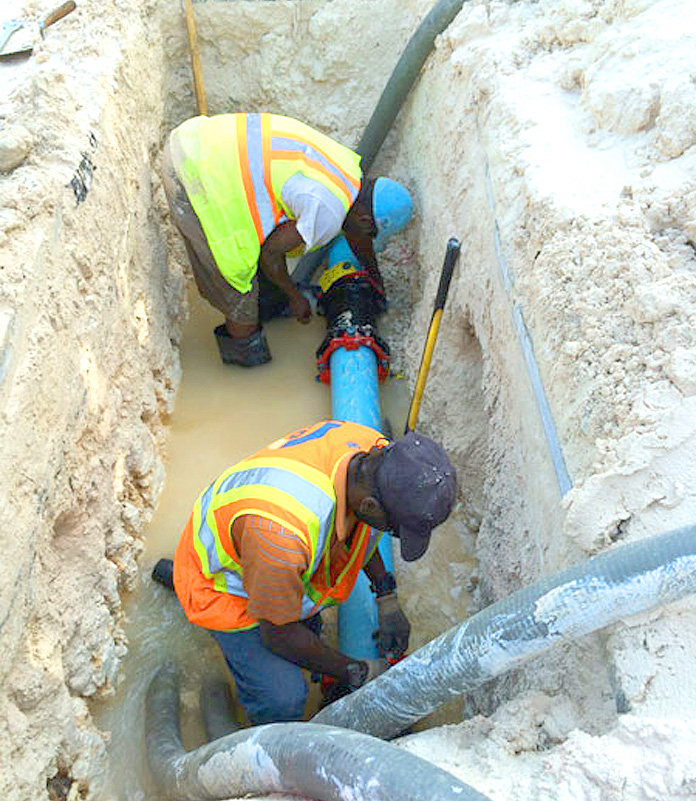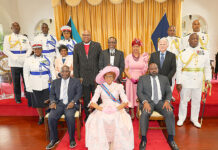
NASSAU, The Bahamas – As The Bahamas is well into completing its preparation to host the 57th Annual General Meeting (AGM) of the Boards of Governors of the Inter-American Development Bank (IDB) and the 31st for the Inter-American Investment Corporation (IIC), the benefits derived from the nation’s collaboration with the IDB is being highlighted.
One such partnership has resulted in various improvements in the country ’s water supply, including an initiative where several millions of gallons of non-revenue water (NRW) was saved from going to waste in the island-nation.
The IDB awarded a loan of $81 million to the Water and Sewerage Corporation (WSC), in December 2011, to improve the efficiency and quality of service provision of potable water, address critical sewerage needs in New Providence and, establish economic and environmental regulatory entities.
Through partial funding from the IDB loan, the WSC awarded MIYA Bahamas a 10-year contract, with the objective of increasing access to fresh water by reducing water losses. Thus far MIYA has exceeded their target goals when it comes to the reduction of water losses in New Providence.
“Historically, the Water & Sewerage Corporation has, because of old and degraded local water distribution utilities, recorded leakage of its potable water as high as 58 per cent of its supply,” said Deputy Prime Minister and Minister of Works and Urban Development the Hon. Philip “Brave” Davis. “In an effort to address this challenge, MIYA Water (MIYA Bahamas), is contractually engaged by the Water and Sewerage Corporation (WSC) to maximise the efficiency of its water systems, that is, to reduce non-revenue water.”
Deputy Prime Minister Davis said that non-revenue water is water produced and distributed, but for which no money is collected by the WSC.
“It consists mainly of water losses through wastage, that is, by way of leaks from the Corporation’s infrastructure; unauthorised use such as theft; and on a lesser scale, metering errors; and through authorized usage such as fire-fighting and mains flushing,” he noted.
He pointed out that agreement with MIYA is to reduce water losses from what was then estimated at five million gallons per day (Migd) to 2.5 Million gallons per day in five years and to two Migd in seven years.
“Further, Miya Water (MIYA Bahamas) was contracted to maintain those reductions until Year 10,” Deputy Prime Minister Davis said. “MIYA conducted studies in 2012 and developed a comprehensive strategy for water loss reduction. They then commenced implementation in 2013. During its studies, MIYA determined that losses were actually almost 6.9 Migd but despite this, the Corporation and MIYA have made significant progress.”
According to MIYA, the essential goals of the project are to improve water utility operations by substantially reducing potable water leakage and build customer support by providing better service.
The project includes a comprehensive suite of water efficiency solutions involving strategic and financial planning based on local NRW audits. This, MIYA added, will be followed by water infrastructure improvements devised specifically for the island.
So far, MIYA stated, there are leak detection teams locating and repairing hundreds of leaks, including one losing 238,000 imperial gallons per day (IGPD), potentially saving a million dollars a year in losses; the installation of new service line installed perpendicular to existing main with updated corrosion-resistant valves; the integration of various software systems for better infrastructure management; and a pilot water efficiency education programme for 5th grade students completed successfully and led to over 20% decreased water consumption in students’ homes.
MIYA has also recruited and trained more than 100 Bahamians to help WSC maintain the results “long after project completion”, the WSC noted.
Also according to the WSC, it has carried out various improvement works throughout the island of New Providence, since then.
“The IDB program has already had a significant impact on WSC,” WSC General Manager Glen Laville said recently. “We have reduced water losses by over one billion gallons within the last two years, a savings of $6.5 million.
“We have a draft Wastewater Master Plan for New Providence and we are finalising designs for addressing our critical sewerage infrastructure needs,” he added. “We are improving our customer experience with online payment, email bill notification, and several other customer account ‘transactions’ will be available online soon.”
The IDB loan, the WSC stated, has also contributed to the strengthening of the corporation as an institution.
A new supervisory control and data acquisition (SCADA) system was installed to better monitor, control, and respond to system challenges and a new system will be installed to help automatically read new electronic meters that WSC will transition to over the next few years. That system will also be compatible with existing meters used by the Bahamas Electricity Corporation, it continued.
WSC is also undergoing organisational restructuring and has been working with a local promotions agency, Barefoot Marketing, to help inform the public about the IDB loan initiatives and strengthen the relationship between the public and WSC.
“The progress we are making due to the loan is something that all staff should be proud of as everyone contributes to the company’s success” said Mr. Laville. “It will go a long way in improving water and sewerage service as well as our communications with our customers.”
Over 1.5 billion gallons of water has already been saved on the project and, “If the Corporation maintains its present savings, over a ten-year period, more than 10 billion gallons of water will be saved,” Deputy Prime Minister Davis concurred. “This saving in water production will be accompanied by savings seven million gallons of diesel and 33 gigawatt-hours of electricity. This is equivalent energy to power over 600 households and over 800 vehicles for 10 years. That is what you call savings.”









